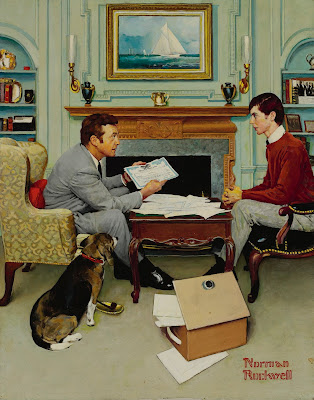Daddy, What's a Demographic?
Daddy, What's a Demographic?
1. Yes, women read comics.
2. Yes, minority identities read comics.
But (and we're talking about a Kardashian level but here) the main demographic for superhero comic books, a staple of the American comics industry, has always been boys and men who still love what boys love. These things include, heroism, strength, vitality, action, adventure, fighting, spectacle, science, fantasy, and sex. Time to clear out some more straw men:
3. Yes, comics are not limited to one list of characteristics.
4. No, comics should not be limited to boys and men.
But adventure/action fantasy specifically made for boys and men is what built Marvel and DC. Of this fact, there is no doubt.
It's insane that I should have to do this much prep-work to make such a simple point. Look at the Romance Novel industry, which I hear is still quite healthy. Who is the demographic for stories about women falling in love and finding it in such unexpected places? Why, women seem to be the audience for such works, yet you don't hear a bunch of cultural movements targeting Harlequin Romance publications and saying that there need be more action scenes and explosions in those books. Superhero comics, on the other hand, have been under pressure for years to redefine its audience and alienate the one that created it. Move aside, men, women need to take control of superheroes!
Why? Why should women, who abandoned the genre and the medium at large years ago, suddenly be shoehorned-in at the expense of the core demographic? Romance comics, the thing that real women actually bought, went out of style years ago, and women found their entertainment through romance novels, films, and TV shows. Ignoring this reality doesn't make it any less true. Men are the primary audience for comics; you can't ignore that fact and then act surprised when sales go down. Boys and men of all ages must be tempted back to the medium. You're not going to do that by having Captain America act like a politically correct Buzzfeed article, peddling propaganda because you don't like how the last election went. You're certainly not going to attract men to a comic book by replacing all the men with girls who talk about how much smarter and better they are than men. What young man wants to spend money only to hear feminist talking points?
 I'm not being academic here. Hawkeye was replaced by a little girl who is oh-so-much-better than he ever was at being Hawkeye. Or shall I talk about Iron Man being replaced by a little girl who was oh-so-much-smarter than he ever was? Shall I talk about Wolverine being replaced by a little girl? How about Thor? How about Mockingbird's T-shirt, mocking masculinity on the cover of the book?
I'm not being academic here. Hawkeye was replaced by a little girl who is oh-so-much-better than he ever was at being Hawkeye. Or shall I talk about Iron Man being replaced by a little girl who was oh-so-much-smarter than he ever was? Shall I talk about Wolverine being replaced by a little girl? How about Thor? How about Mockingbird's T-shirt, mocking masculinity on the cover of the book? Boys and men have gotten the message, they aren't welcome in the very medium they created and sustained through good times and bad. If the industry cannot specifically attract boys and men to buy products, the industry as we know it cannot continue.
Since the geniuses at the major companies seem stymied regarding how to market themselves to their core demographic, perhaps a refresher course is in order. Boys want to un-ironically save the world. They want to feel powerful. Why else would they gravitate towards the impossible ideal of a superhero? Is it any wonder why there is such crazy money being made by 1980-1990s nostalgia? These were times before political correctness labelled masculinity "toxic," and boys were allowed to be, dare I say it, boys. Uh-oh, I see some more scarecrows comin', better head them off at the pass:
5. No, I am not defending sexual assault. Do I have even have to say this?
You can't stop boys and men loving explosions, punching, dirty jokes, and sexually attractive women. If the superhero genre becomes the converged wasteland it is so quickly becoming, they will look elsewhere. Scratch that; they have already gone. Boys and men quickly found that Japan understands demographics. They have manga for men and women that satisfy a plethora of tastes. Women can read romance or drama comics. Boys can read action books that celebrate what they want and do not lecture them. Guess which industry has been doing better?


Comments
Post a Comment